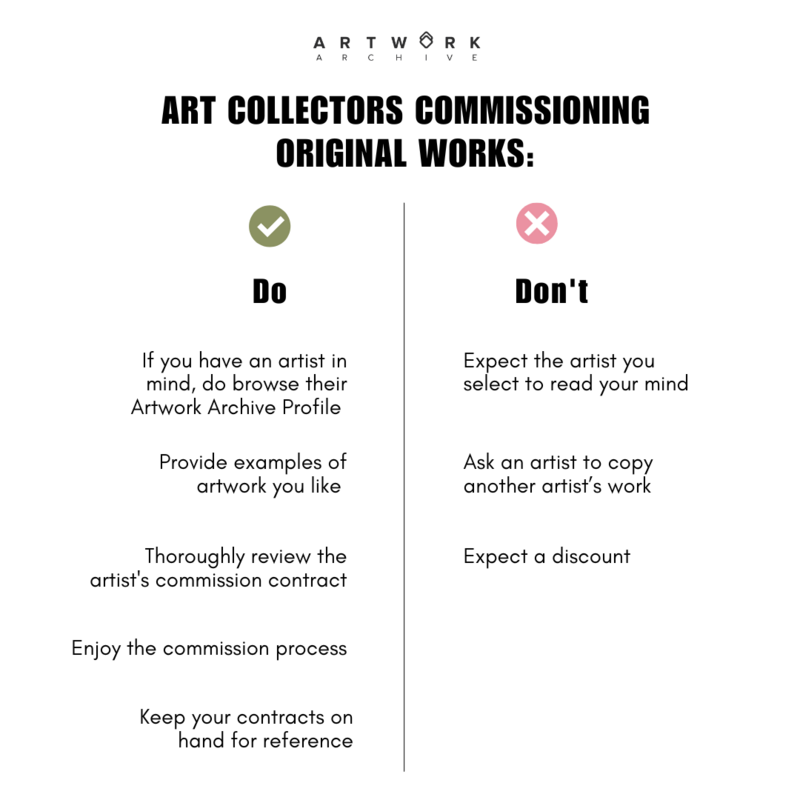 Photo of artist Ana Zanic with her work "Reef," Watercolor 55"x93." All rights reserved 2023
Photo of artist Ana Zanic with her work "Reef," Watercolor 55"x93." All rights reserved 2023
How should art collectors go about commissioning an artwork?
You want to make the dive into art collecting but you desire something unique to your life that holds personal meaning and you haven’t seen exactly what you’re imagining yet in your online searches and gallery visits.
Maybe you have a big anniversary or birthday coming up or you want to celebrate a promotion in a unique way with an original custom piece you can gaze at in your new corner office. Maybe you already have an artist friend you’ve thought would be fun to commission and finally have the money saved up to get the process going. Regardless, you’re not exactly sure where to start with commissioning original art, so here are our Artwork Archive's basic dos and don’ts of commissioned work for collectors.
Do: If you already know which artist you want to commission, spend time looking at their portfolio on Artwork Archive.
Arrange a studio visit if possible to see recent works in person. Pay attention to when works were made— if you want a piece similar to the work they were making 5-10 years ago, understand that they may not be interested in revisiting that old series.
Artists like to move forward in their careers just like anyone else. Make sure you like their recent work and style before you commit to a commission.
Don’t: Expect the artist you select to read your mind.
The best commissions tend to come from two scenarios. In the first scenario, the collector likes the artist’s entire portfolio and trusts them to create something custom for them with very little additional guidance beyond logistical elements such as framed size and project budget. In the second scenario, the collector likes the artist’s style and gives extremely specific information regarding the subject, composition, and color palette.
Know which category you fall into and come to the commission conversation prepared with what you want and acknowledgment of what will make you happy.
Do: Provide examples of artwork you like and personal photos to base representational work on.
If you want something extremely similar to a piece they have already made, make note of the changes you would want in your commissioned artwork. Many commissions are for work that is a variation of existing work. Take note of which changes you would like in your commission, like size or color scheme.
Visual references are so helpful when starting the commission conversation. If there are elements of your visual references you don’t want the artist to incorporate or use, make sure to tell them. If possible, provide notes in writing about how you envision the work and what components are essential to you.
You can easily collaborate with artists using the Private Rooms feature on Artwork Archive. With Private Rooms, artists can send you a curated grouping of artworks that you might be interested in basing your commissioned work on. From there, you can favorite or send messages about specific works to get closer to your collaborative idea.

Don’t: Ask an artist to copy another artist’s work.
Even if it is a famous piece of art, ethically this is a gray area. Even if anyone who visits your apartment will know you don’t have the real Mona Lisa, having an artist replicate an exact artwork is off-limits. However, homages to very famous works, such as a cartoon of the Mona Lisa done in the commissioned artist’s style are ok. Remember, the person you are commissioning should already make work in the style you prefer.
It isn’t a good idea to commission an artist whose artwork you don’t especially like and then ask them to make something completely different from the kind of work they make—that’s like going to a podiatrist and asking for brain surgery, who is really going to win in that scenario?
Do: Carefully read over the commission contract the artist provides you with.
The art commission contract should clearly lay out how much the total commission will cost, when it will be completed, how and in what condition it will be delivered to you (framed or unframed for 2D works), and the payment schedule you are expected to adhere to.
A commission contract outlines the conditions for an artist to create a commissioned work. Contracts generally specify project dates, payment schedules, notable project requirements, or constraints. They also build out scheduled check-in points for the artist and commissioner.
Many artists are fine with installment payments, so if you need a payment plan, you can ask for one when reviewing the contract.
Commission contracts also typically build in a nonrefundable deposit for the planning phase and a percentage retained by the artist for broken contracts. This is to protect both parties— if the artist can’t produce the work to your satisfaction they are still paid for the time spent creating sketches and communicating with you. And, you are free to commission someone else to complete the project without having to pay the full cost if the project can't be completed to your liking.
Click here to view a template example for creating a Commission Contract.
You can also learn more about how to create and use commission contracts here.
Don’t: Expect a discount.
It’s possible that commissioned works cost more than other already available pieces in an artist’s studio.
This is because commissions take the artistic freedom away from the artist and give it to the collector. They often also take more time than noncommissioned work.
You are selecting the subject or influencing elements of the piece, and it would not be made without you. It’s possible the piece you are commissioning of, say, your favorite literary character as a penguin, doesn’t fit into the artist’s portfolio and won't be anything they can use on grant applications with their other artworks.
While the artist may enjoy doing commissions and likely wants you to be happy, they are doing the commission as a job to earn money.
Do: Enjoy the commission process.
You are having something created that will probably outlive you.
Many of the greatest works of art history were originally commissioned—think the Sistine Chapel!
Plus you’re supporting the smallest of businesses, one person working hard at what they love and that is a wonderful thing to spend money on.
Do: Keep your contracts on hand for reference
Make sure you have your contracts on hand for reference. Store contract templates and previous contracts in your My Docs section of Artwork Archive for future reference.
Then, schedule your check-in with reminders on your schedule so that you don’t miss important dates.





